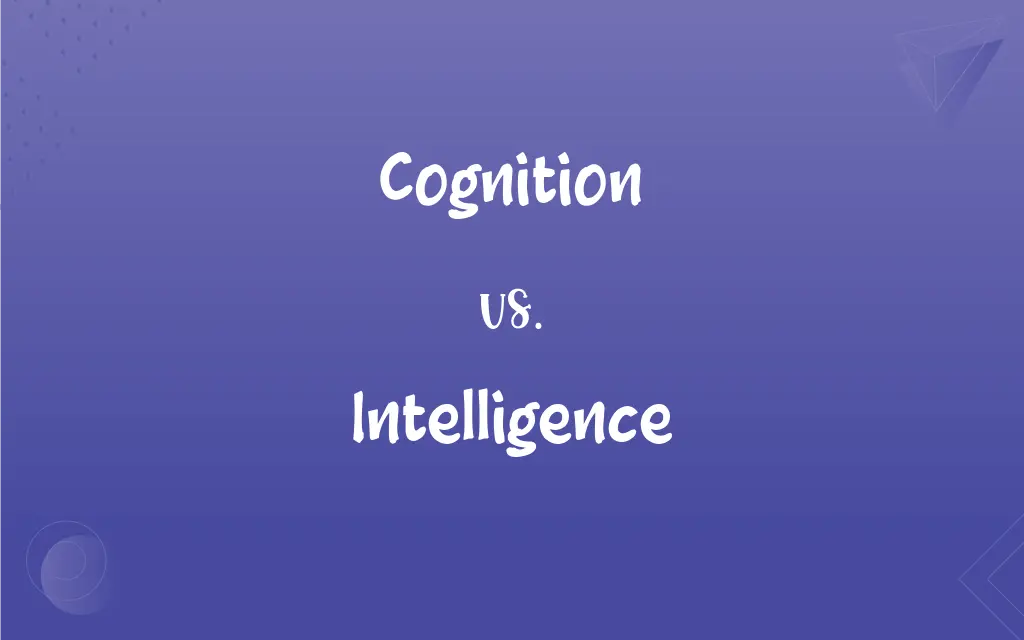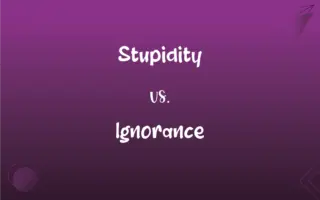Cognition vs. Intelligence: What's the Difference?
Edited by Janet White || By Harlon Moss || Updated on November 21, 2023
Cognition refers to the processes of acquiring knowledge, while intelligence denotes the ability to learn, reason, and solve problems.

Key Differences
Cognition encompasses the mental processes involved in gaining knowledge and understanding. These processes include thinking, knowing, memory, attention, and perception. Intelligence, on the other hand, often refers to an individual's capacity to process information, reason, solve problems, and adapt to new situations.
Cognition is a broader term that can be thought of as the machinery or tools our brain uses to process information. It involves various functions and abilities that enable us to interact with our environment. Intelligence is a measure of how well we can use these cognitive tools to achieve certain outcomes, such as solving problems or making decisions.
Cognition doesn't necessarily imply effective or successful information processing. A person can have highly developed cognitive functions yet struggle with tasks that require advanced reasoning or problem-solving. Intelligence, however, suggests a proficiency in these tasks, often reflecting how efficiently or adeptly one uses their cognitive abilities.
Both cognition and intelligence play crucial roles in our daily lives. While cognition focuses on the processes, intelligence emphasizes the outcome. Thus, while everyone has cognitive abilities, differences in intelligence indicate the variability in how effectively individuals can utilize those abilities.
Comparison Chart
Definition
Mental processes of acquiring knowledge.
Ability to learn, reason, and solve problems.
ADVERTISEMENT
Focus
Processes
Outcome
Measurement
Often qualitative
Often quantified (e.g., IQ scores)
Scope
Broader
Specific to efficiency and adeptness
Application
Describes functions
Indicates proficiency
Cognition and Intelligence Definitions
Cognition
Brain functions relating to thinking and perceiving.
Impairments in cognition can impact daily activities.
ADVERTISEMENT
Intelligence
Capacity for reasoning and problem-solving.
His intelligence allowed him to solve complex puzzles.
Cognition
The act of acquiring knowledge.
Through cognition, he grasped the new concept.
Intelligence
Aptitude in learning and understanding.
Children's intelligence often shines in interactive environments.
Cognition
Mental processes of understanding and awareness.
Her cognition of the world expanded as she traveled.
Intelligence
The ability to acquire and apply knowledge.
Her intelligence was evident in every discussion.
Cognition
Interpretation of sensory inputs and experiences.
His cognition of the event differed from the others'.
Intelligence
Measure of cognitive abilities' efficiency.
Intelligence tests provide a score reflecting cognitive performance.
Cognition
The way information is processed by the mind.
Meditation can enhance one's cognition over time.
Intelligence
Ability to adapt and respond to new situations.
Evolutionary intelligence helps species survive changing conditions.
Cognition
The mental process of knowing, including aspects such as awareness, perception, reasoning, and judgment.
Intelligence
The ability to acquire, understand, and use knowledge
A person of extraordinary intelligence.
Cognition
That which comes to be known, as through perception, reasoning, or intuition; knowledge.
Intelligence
Information, especially secret information gathered about an actual or potential enemy or adversary.
FAQs
What is cognition?
Cognition refers to the mental processes involved in acquiring knowledge.
What is intelligence?
Intelligence denotes the ability to learn, reason, and solve problems.
Is cognition always a measure of intelligence?
No, cognition describes mental functions, whereas intelligence measures how well these functions are utilized.
How does cognition relate to intelligence?
While cognition focuses on the processes, intelligence emphasizes the outcomes or proficiency in using those processes.
Can one have high cognition but average intelligence?
Yes, an individual can have well-developed cognitive functions but might not use them efficiently, reflecting average intelligence.
Can cognition be improved?
Yes, through certain activities and exercises, cognitive functions can be enhanced.
Are intelligence tests a measure of cognition?
They measure intelligence, which indicates how efficiently one uses their cognitive abilities.
Is intelligence fixed or can it change?
Intelligence can be influenced by various factors, including environment and education.
Is memory a part of cognition?
Yes, memory is an essential component of cognition.
How is intelligence different from wisdom?
While intelligence relates to problem-solving and reasoning, wisdom involves accumulated knowledge and the ability to apply it.
Are there different types of intelligence?
Yes, theories suggest multiple intelligences, including linguistic, logical-mathematical, and emotional.
How is cognition involved in perception?
Cognition interprets and processes sensory inputs, leading to perception.
Does aging affect cognition?
Aging can impact certain cognitive functions, but not all cognitive abilities decline with age.
Can children have high intelligence?
Yes, many children display high intelligence at a young age, which can be nurtured.
What roles do cognition and intelligence play in learning?
Cognition encompasses the tools for learning, and intelligence indicates how efficiently those tools are used.
How do health issues impact cognition?
Certain health issues, like Alzheimer's, can significantly impact cognitive functions.
Is emotional intelligence a type of intelligence?
Yes, emotional intelligence focuses on recognizing, understanding, and managing emotions.
Can animals display intelligence?
Yes, many animals show signs of intelligence through problem-solving and learning.
Why is understanding cognition important in education?
Understanding cognition can help in devising strategies and techniques to enhance learning.
How do genetics play a role in intelligence?
While genetics can influence intelligence, environmental factors also play a significant role.
About Author
Written by
Harlon MossHarlon is a seasoned quality moderator and accomplished content writer for Difference Wiki. An alumnus of the prestigious University of California, he earned his degree in Computer Science. Leveraging his academic background, Harlon brings a meticulous and informed perspective to his work, ensuring content accuracy and excellence.
Edited by
Janet WhiteJanet White has been an esteemed writer and blogger for Difference Wiki. Holding a Master's degree in Science and Medical Journalism from the prestigious Boston University, she has consistently demonstrated her expertise and passion for her field. When she's not immersed in her work, Janet relishes her time exercising, delving into a good book, and cherishing moments with friends and family.








































































